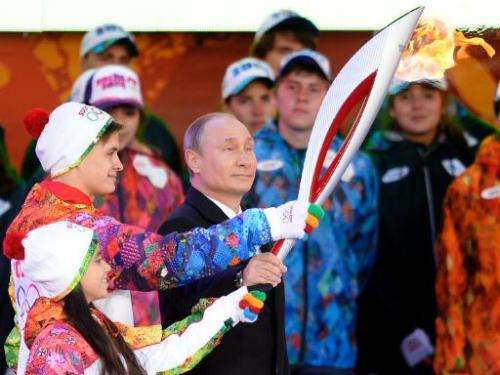Russian President Vladimir Putin handles a torch in Moscow on October 6, 2013, to start the relay across Russia
When Russia first floated the idea of sending the Olympic flame to the International Space Station (ISS) ahead of next year's Winter Games in Sochi, most people treated it as a joke.
It was February 2011, three years before the launch of the sporting extravaganza, when a top-ranking official in Russia's space agency suggested featuring the ISS in the traditional torch relay ceremony.
Sending the Olympic flame to space "is not a bad idea," said Vitaly Davydov, who served as deputy head of the Federal Space Agency (Roscosmos) at the time. "It is theoretically possible."
It turned out that Davydov was just a bit too optimistic—although not entirely off the mark.
More senior Russian officials eventually decided that bringing an open flame on board a Soyuz rocket filled with tonnes of explosive fuel was not a wise idea.
Besides, internationally-agreed rules governing the ISS forbid fires from being lit on board the orbiting lab, for obvious safety reasons.
So Russia came up with a Plan B: sending the Olympic torch to space without the flame, which would remain rooted to the ground in a special capsule resembling a small oil lamp.
But, to create that bit of drama, the torch would then be taken out for a space walk—something that would look stunning on television and draw attention to Russia's mastery of both space and sport.
The torch is now scheduled to blast off for the ISS on November 7 and return back to Earth on November 11.
The honour of taking the torch outside the station on November 9 will fall on Russian cosmonauts Oleg Kotov and Sergei Ryazansky, who went up to the station together with NASA's Michael Hopkins on September 26.
"I will climb out first with a video camera in my hand and other photo equipment," Ryazansky told reporters before blast-off.
"Then Oleg will climb out with the torch, and I will be the one taping it. Then we will switch—if he lets me hold the torch," Ryazansky joked.
© 2013 AFP
























